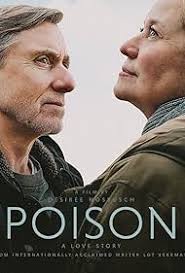
POISON
Luxembourg, 2024, 86 minutes, Colour.
Tim Roth, Trine Dyrholm.
Directed by Desiree Nosbusch.
This is a production from Luxembourg, director from Luxembourg, the filming there, the audience appreciating some of the beauty of the city, the water and bridges, the forests, the mountains.
This is a film of dialogue and so it is not surprising to find that it is originally a play for the theatre, adapted by the playwright, Lot Vekemens, who is from Holland. The film has a female sensibility from the director and the writer.
Poison is a very strong title. However the reference is not to physical poison but to poison of the emotions of the mind, suddenly caused by an unexpected accident, the death of a child, and the ability and inability of each parent to deal with the grief, and to work with each other in the tragic situation, the husband leaving, finding another wife, another child, the mother staying.
The scenario has news of alterations being made in the cemetery and so the couple coming together, she trying to avoid her ex-husband but, finally, their engaging in strong conversations, a range of moods, guilt issues, blame issues, acknowledgement of the issues. And, for the film opening out, less stage-bound,, there are several locations for continuing the conversations, in the cemetery office, outside in the cemetery grounds, a long conversation in a church, with rain and conversation in the front seat of the car, and, eventually, a long walk up a mountain road, some powerful sequences, especially a long single take sequence the camera focusing on the couple and their interchanges as they walk up the mountain.
Ultimately, there is some kind of reconciliation, the husband positing the possibilities for hope or piece and the wife saying, ‘both’.
The two actors do more than justice to the dialogue, a different performance from Tim Roth, who has had a career of more than 40 years in Britain and in the United States. The wife is played by Danish actress Trine Dyrholm, winner of many prestigious awards appearing in many classic films including Margritte, Queen of the North, the Commune, Queen of Hearts.
- The poison of the title, dire circumstances, grief, the consequences, guilt and blame? The need for eliminating the poison, especially after it festers for years?
- The film based on a play, the focus on dialogue, a two hander and interactions, the limited locations, character and verbal drama?
- Writer and the director, Luxembourg background, filming there?
- The impact of the location photography, the roads and highways, the coast, the mountains, town and views, the cemetery, the church and interiors, walking the mountain parts? The musical score?
- The gradual revelation of the relationship between Lucas and Edith, the marriage, tensions, the death of their child, different ways of coping, grieving, Lucas and his leaving, a further relationship and child, Edith staying, making a life for herself, her work, but alone?
- The introduction to each character, Lucas, leaving home, his driving, at the sea, the coffee, taking time to reflect, going to the cemetery? The contrast with Edith, busy at home, her garden, the bicycle, riding through the town, arriving at the cemetery, in the office, initially trying to avoid Lucas?
- The dialogue creating the tension between the two, the audience not quite sure of the reasons? Edith, inattention, avoiding Lucas, the revelation of 10 years’ separation, yet her memories of the past, wary of interaction with him? The importance for Lucas of meeting Edith again, for some kind of resolution?
- The revelation of character through the dialogues, hostilities, explanations, detailed memories, accusations, defences, the changing of moods, Edith and her explanation of her life over the decades, Lucas and his marriage, child, the story about his joining the choir and its effect? Her laughing, their laughing?
- Something of a rapport between them, bridging the 10 years, Edith’s demands on Lucas’s memory, his memory of details, driving away, thinking he should turn back, but couldn’t? And remembering the dead child every day? As did Edith?
- The locations, the discussions in the confined office, going outside, the long conversations in the church and the religious atmosphere and background, the rain, in the car, going to the final walk? The locations affecting the mood of the conversation?
- The satisfaction for each in the meeting, talking, some mutual understanding, moments of forgiveness, and embrace, the returning to their lives?
- The final aerial overview of the city, Edith and her bike, the water on the bridge, the forests? And leaving the audience to contemplate their response to each of the characters, to the sad situation, irrevocability, failures, grief, hopes? And the issue of whether one could have peace or hope, and Edith replying, both?